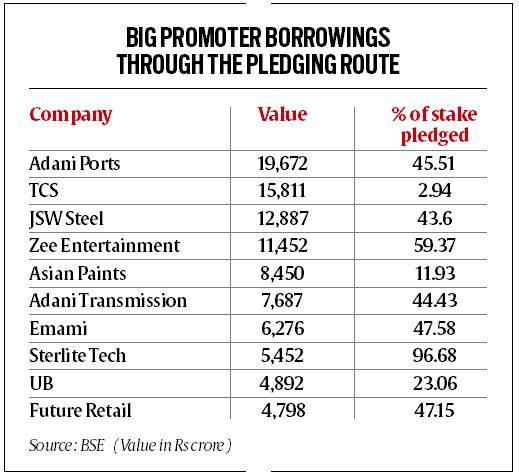Lenders turn cautious in share pledging business after recent repayment defaults
Promoters of 2,947 firms pledged their shares worth round `2,24,179 cr, according to BSE data.
 According to the BSE data, the promoters of many companies like Eskay Knit, Gammon, GTL Infra, IL&FS Investment Managers, IVRCL, CG Power and Industrial and Bajaj Hindusthan have pledged 100 per cent of their holdings.
According to the BSE data, the promoters of many companies like Eskay Knit, Gammon, GTL Infra, IL&FS Investment Managers, IVRCL, CG Power and Industrial and Bajaj Hindusthan have pledged 100 per cent of their holdings.
Lenders who have funded promoters through the share pledging route have turned cautious after the recent mega defaults on repayments by two business groups with the regulator Reserve Bank of India taking a closer look at the activities in the segment and lenders — mainly finance companies and mutual funds — reviewing the position of overleveraged promoters.
Promoters of as many as 2,947 companies — out of more than 4,100 companies listed for trade — have pledged their personal holding worth around Rs 224,179 crore, according to data available from the BSE. Six companies in the top 500 companies had more than 90-100 of their promoter holdings pledged.
These promoters are already overleveraged and any mismatch in repayment could spell more trouble for lenders. Promoters usually raise funds against the shares pledged for the same company or to finance other projects. It means that these shares are offered as collateral to financial institutions in exchange for loans.
According to the BSE data, the promoters of many companies like Eskay Knit, Gammon, GTL Infra, IL&FS Investment Managers, IVRCL, CG Power and Industrial and Bajaj Hindusthan have pledged 100 per cent of their holdings. The big borrowers through the share pledging route included the promoters of JSW Steel (Rs 12,887 crore), Zee Entertainment (Rs 11,452 crore), Adani Ports (Rs 19,672 crore), Emami (Rs 6,276 crore), Adani Transmission (Rs 7,687 crore), TCS (Rs 15,811 crore), Sterlite Technologies (Rs 5,452 crore) and Future Retail (Rs 4,798 crore), as per the BSE data.

Promoters of 116 companies in the BSE-500 Index group pledged their shares worth Rs 1,96,000 crore, which is about 1.47 per cent of the total market capitalisation in December 2018, according to Kotak Securities. Some of them have pledged 50-100 per cent of their personal holdings, with lenders to raise funds for various purposes. “The companies run by many of these promoters are already in the stressed asset list of banks. Any crash in share prices could lead to problems for the lenders. Lenders have tightened their due diligence,” said an institutional source.
Over-indebtedness of the promoters is the crux of the problem. “Pledging shares is just a vehicle used for borrowing. We think there is nothing right or wrong about this vehicle compared to any other as long as the lender due diligence is thorough. The core issue is whether the borrowers are borrowing on a prudent basis or are they overextending themselves. We have seen time and again that over-indebtedness ends badly for the borrower and the lender regardless of the vehicle used,” said the CEO of a mutual fund.
The promoters of two corporates which were in the limelight recently for delay in loan repayments have pledged their holdings worth over Rs 26,000 crore to lenders. A corporate house had recently announced a “standstill period” with NBFCs and mutual funds after the shares pledged by the group crashed and the NBFCs who lent money sold the promoters pledged shares in the market.
In January, an entertainment group also worked out a standstill period and moratorium with NBFCs and MFs for repayment of loans taken through share pledging. “This moratorium or standstill period on repayment is an indirect form of loan recast. The RBI had already scrapped all forms of loan restructuring and banks and NBFCs are supposed to classify such assets,” said a banking source, adding that the central bank has sought details about such arrangements. The RBI is likely to come out with measures on “loan restructuring” or “evergreening” of loans by NBFCs which are under the RBI regulations. However, Sebi is yet to come out with any plan to track the role of mutual funds, which are also big players in the pledging business.
High pledging levels are typically not considered as a good sign by investors as a downturn in the market price can lead to invocation and change in management. Further, decline in the level of share pledging may indicate scaling down in stress. These shares are purely collateral when the situation is hunky-dory. The ownership is retained by the promoters, but lenders have the right to sell pledged shares in case the borrower defaults or when the shares crash in the stock market. When the market price of shares pledged by the promoters of small companies crashed last year, lenders sold these shares to recover their funds.
- 01
- 02
- 03
- 04
- 05































